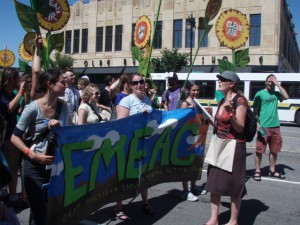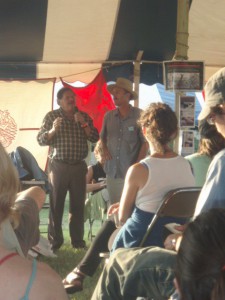 Last week, I had the opportunity to travel to Detroit for the second U.S. Social Forum. It was an incredible gathering of over 15,000 people from every corner of the United States, as well as allies from countries such as Honduras, Haiti and Palestine.
Last week, I had the opportunity to travel to Detroit for the second U.S. Social Forum. It was an incredible gathering of over 15,000 people from every corner of the United States, as well as allies from countries such as Honduras, Haiti and Palestine.
In the spirit of the World Social Forum, which will take place in Dakar, Senegal in 2011, the USSF created a space for reflection, creative thought and inspiration for all of us working for social and environmental justice in the United States to come together. We marched, prayed, danced, talked, deliberated, presented, watched, listened and learned. There were over a thousand workshops on every topic you could think of ranging from challenging multinational corporations like Cargill and Chevron to reforming our immigration policies. Additionally, there were over 50 People’s Movement Assemblies that put together concrete resolutions and steps for action.

I participated in a workshop organized by the Democracy Center from Bolivia entitled, “Taking aim at Multinationals: Strategic Lessons in Anti-Corporate Campaigns” where I shared lessons from the ongoing campaign to hold Chevron accountable for their destruction of the Ecuadorian Amazon and the international movement against Chevron that is building. What’s really clear to me, and to anyone who’s paying attention to the oil spill, oil hearings etc., is that it’s not just about Chevron or BP, it’s about the entire oil industry. The oil industry isn’t accountable and never will be, so we need to mobilize to demand a permanent moratorium on offshore oil drilling and real energy solutions that will provide green jobs in places like Detroit, Houston, Richmond and beyond.
I co-led a workshop and skillshare with my colleague Hillary Lehr and activists from RAN Twin Cities entitled, “Climate Change at the End of Your Fork: Organizing Locally to Change Agribusiness as Usual.”
The inspiration for organizing this workshop was tri-fold. First of all, after reading Anna Lappe’s book, “Diet for a Hot Planet” this Spring, I couldn’t stop thinking about the fact that up to 32% of global greenhouse emissions are from our global food system. That’s more than all the world’s cars, trucks, trains, planes, ships and factories combined. Don’t get me wrong, we need energy efficient vehicles. But, we need energy efficient food and agriculture, not agribusiness as usual.
Secondly, the Agribusiness Action Initiatives Working Group on Climate Change, which RAN is a part of, recently released a report entitled, “Harvest of Heat: Agribusiness and Climate Change” highlighting how companies like Cargill, ADM, and Monsanto are responsible, but unaccountable for the adverse climate impacts related to our global food system.
Finally, Cargill is the world’s biggest agribusiness company, the largest private corporation in the U.S. and the biggest importer of palm oil into the U.S. Cargill also happens to be the target of our Rainforest Agribusiness campaign. As you know, we’re working to hold Cargill, and its customers like General Mills, accountable for rainforest destruction for palm oil plantations in Borneo.
This was a great opportunity to share information about food, agribusiness and climate change and what our campaign has been doing locally in the Twin Cities and nationally to hold Cargill and General Mills accountable. While the workshop was small, those who attended expressed that they want to either get involved in our campaign or get more involved in promoting food sovereignty through urban gardening in their communities.
Speaking of food sovereignty, the People’s Movement Assembly on Food Sovereignty was amazing and inspirational! It brought together organizations affiliated with the U.S. Food Sovereignty Alliance (formerly Food Crisis Working Group), including: Food First, Agricultural Missions, Grassroots International, WhyHunger and guests from La Via Campesina to discuss how to build a movement for food sovereignty- the people’s democratic control of the food system, the right of all people to healthy, culturally appropriate food produced through ecologically sound and sustainable methods, and their right to define their own food and agriculture systems.

From this People’s Movement Assembly, commitments were made to rebuild local food economies; democratize land access; demand an end to global land grabs, end corporate and military occupations, fair trade; endorse actions that include the liberation of land and water resources for the production of food and sustainable livelihoods; and demand a world in which everyone has control over their food and no one has to put food in their mouth that hurts people or the environment.
Another World is Possible! Another U.S. is Necessary! Another Detroit is Happening!